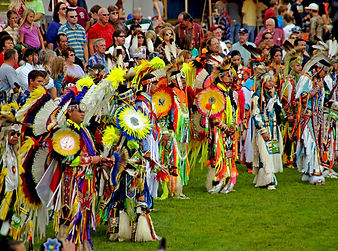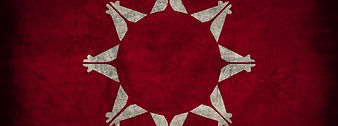
Native American Literature Anthology 2.0
Sara Downs
Nicholas Black Elk
Black Elk was born in 1863 amoung the Oglala Lakota tribe. Black Elk did many things throughout his life such as travling with Buffalo Bill's Wild West Show, participating in the Ghost Dance, and even surived a gun shot during the Wounded Knee Masacre. His only published work is Black Elk Speaks. This book was told orally by Black Elk, then translated by his son Ben, then finally recorded by John G. Neihardt - a professor of English at the University of Nebraska-Lincoln (and the namesake of Neihardt dormatory).

1



High Horse's Courting
So High Horse sneaked around until he could not talk to the girl again, and he asked her to run away with him. He told her he thought he would just fall over and die if she did not. But she said she would not do that; she wanted to be bought like a fine woman. You see she though a great deal of herself too. That made High Horse feel so very sick that he could not eat a bit, and he went around with head hanging down as though he might just fall down and die any time.
That night late they snaked up to the girl's tepee and wiated until it sounded inside as thought the old man and the old woman and the girl were sound asleep. Then High Horse crawled under the tepee with a knife. He had to cut the rawhid thongs first, and then Red Deer, who was pulling up the stakes around that side of the tepee, was going to help drag the girl outside and gag her. After that, High Horse could put her across his poney in front of him and hurry out of there and be happy all the rest of his life.
Black Elk's "High Horse's Courting" is a different type of Native American literature. This story was passed down orally and not transcribed by the narrator. Unlike many selections this story is all about love, with an added sense of humor. In the first paragraph selected High Horse is pining for the young woman. He tries to find anyway he can talk to her, even if it's only for a few minutes. He wants to run away with her, but she rejects him. She wants to be bought. She wants her family to obtain horses and goods; she wants them to benefit from her relationship. The paragraph ends with a comical line that allows the reader to see just how in love High Horse is with this woman. In a way the stereotypical roles of a love story are switched. Many times it's the woman who pines for the men, but in this text, it's the man who pines for the woman. The woman is playing hard to get (which can be argued as typical) but it's the raw emotion seen from the male character that is unusual. The fact that he openly admits that he might fall down and die if the woman doesn't accept his proposal is not typically seen from a male character.
The second paragraph brings to light a very anti-feminist theme to the story. Though, the woman rejected High Horses's proposal, he decides to steal her away and force her to be with him. He holds complete disregard for the woman's wishes, and goes ahead and does what he wants despite her. It even goes as far as to cut her from her bed, gag her, and ride away with her in thinking she will be happy with him. Many could argue that High Horse is doing this out of love and his intentions are good, however there is a darker undertone. Instead of coming up with a way to change the woman's mind, he goes straight to brute force. This is supposedly a true story, and it goes to show the roles of women, and the lack of power women have over their own lives.
I liked this story because it was truly ridiculous and it did make me laugh. To me, this piece is almost satirical of traditional romantic comedies. However, the anti-femenist undertones disturbed me a bit. This could be because I'm taking a women's literature class at the same time, but this is almost the textbook definition of rape culture. The second paragraph shows men that if they want a woman bad enough he can do what he wants with her despite her wishes. This sends out the wrong message for men and degrades women in extremes. Times have changed since Black Elk was alive, and in his time this story might not have raise the alarms as it does now. Despite these negatives portrayls, I think this is another successful work in showing Indian humor.